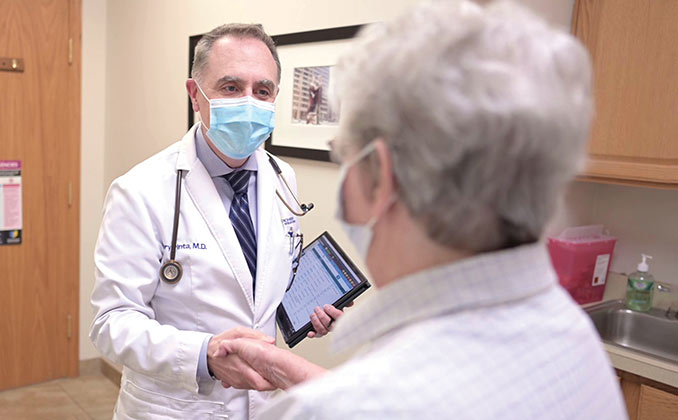Ignite | Fall 2022
The Pricelessness of Primary Care: Gary Pinta
BY RODERICK L. INGRAM SR.

Gary Pinta, M.D.
When the president of Pioneer Physicians Network, Gary Pinta, M.D., talks about his practice, he first stresses his physician-owners’ “passion for primary care.”
Fifty-five physicians. 18 clinical locations. Three Ohio counties – Medina, Stark and Summit. All primary care.
The group narrows its primary care to family medicine, internal medicine and pediatrics. No obstetrics-gynecology, nor are any of them specialists.
“We really love it. Trying to get people to understand the value of primary care was a big push with NEOMED when I was a medical student,” Dr. Pinta said. “Not all students were sold on it. But many of us believed in it and embarked on a journey. We wanted to foster that relationship, that long-term friendship between a primary care doctor and their patient.”
Dr. Pinta graduated from NEOMED’s College of Medicine in 1994 and matched at Summa Health System for residency.
“I felt like I could make a name for myself as a student at NEOMED as opposed to the larger schools like Ohio State University and as a physician working in this area, instead of a larger city like Cleveland.”
Everything was happening as wonderfully as he envisioned, but Dr. Pinta said that he knew early on that he didn’t just want to go into medicine. He also wanted to own a business.
He began making plans to start a practice at a Summa Health facility that he hoped would open in Macedonia, Ohio. But the opening never occurred.
Trust Your Instincts
The health system’s change of plans was devastating. Fortunately, around that same time, he was introduced to the Pioneer Physicians Network. It felt like the perfect opportunity but the supportive words from a colleague who had been somewhat of an adversary gave him pause. Then the colleague told Dr. Pinta to trust his instincts about this opportunity for ownership. That he should go for it.
He was right.
Dr. Pinta said, “We believed that we could drive positive health care change by strengthening primary care doctors and their relationship with patients.
“And from there, everything else developed,” he added.
The physician-owners formed the Ohio Independent Collaborative (OIC) – a group of the six largest primary care groups in Ohio — Dr. Pinta serves as president.
They formed a malpractice captive; a group purchasing organization to acquire supplies at cheaper prices; and group contracting for a Medicare Advantage plan with their own value-based contract platform and agreement.
Dr. Pinta added, “It’s a full risk contract for Medicare Advantage…Now we’re on a value-based platform for which we take our revenue from the contract. We pay all bills for all patient expenses, and whatever is left over is put in surplus. This promotes primary care’s ability to keep up in the marketplace – which is very tenuous at best.”
They also created additional resources for doctors and patients by forming a team of care nurses who work for the network — not the insurance companies — to support the patients’ care throughout the spectrum.
“This [value-based care] is in contrast to where we were before with fee-for-service, where you go into your office and try to do your best at billing and coding to see as many patients as you can. With fee-for-service you don’t really have a support system to help you take care of your patients and support their outcomes beyond your business.”
Outcomes and Incomes
Pioneer Physicians Network’s entire team supports their primary care patients. They follow patients through their hospitals, specialists and, according to Dr. Pinta, “everything else until they contact them back — this keeps doctors in the center of it all.
“I don’t think our doctors have ever been this happy.”
Even before forming the OIC, the network’s Net Promoter Score (NPS) was 86, which indexes higher than average of any industry and is in the top percentile.
This is a result of having dedicated primary care doctors taking care of patients.
He said they had to support the doctors too as the strains of more paperwork, reimbursement not keeping up with inflation, and so many other things like coding just added to their stress levels.
There are more than 70,000 codes for billing in health care.
It’s pretty complex stuff.
For the Pioneer Physicians Network, the OIC made it less so.
Calling it, ‘incomes from outcomes,’ Dr. Pinta said, “It takes the pressure off of fee-for-service and having to see more patients. Personally, I went from seeing 25 to 27 patients a day to 15 to 17.
“Outcomes and satisfaction are simply better. This system incentivizes physicians to make that extra phone call. To ask that extra question. The old system did not.”
